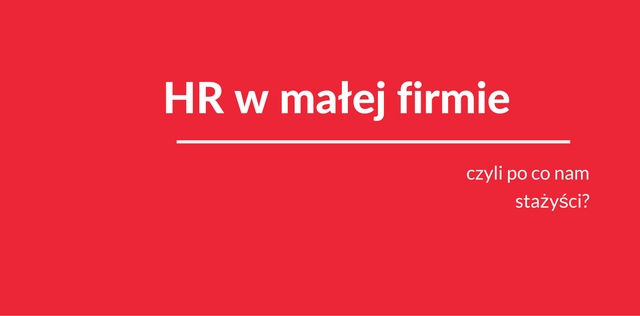HR in a Small Company - about Internships from a Practical Perspective
I understand the perspective of companies that avoid interns. I understand that it stems from fear, reluctance to get involved, and additional responsibilities. I understand the objections that you need to invest time and energy, and the intern disappears after a month, so the investment seems unprofitable.
I understand, but I disagree.
Avoiding engagement as an idea to justify complaining about young, unengaged people?
We hear that golden times are coming for the youngest employees.
Generation Y, which was supposed to turn the job market upside down, is already being replaced by Generation Z, born after 1995 with smartphones in their hands, permanently connected to the internet.
We hear discussions about fear of Gen Y - future colleagues at work. Piles of stereotypes that throw everyone into one generational bag are crashing down with a bang.
If this fear is real, if companies are actually afraid of young people, then I understand even less those who avoid organizing internships. And I congratulate even more those who create positions for trainees and interns and use the insights.
In May, two interns appeared in our company, Kamila and Patrycja, students from a technical school specializing in advertising organization. We started with the assumption that the interns would engage our time and energy, and we agreed to this.
We made an agreement among ourselves:
first - supervising interns does not paralyze normal work in the office,
second - interns don't make coffee,
and third - we end the cooperation immediately if it turns out that the interns are unreliable, dishonest, or reluctant to work.
The internship was organized by the girls' school, and we knew the general expectations. Our main task was to give Kamila and Patrycja the practical side of working in an advertising agency office, and our ambition was to prepare them as well as possible for entering the job market and for interviews with potential employers in the future.
We adopted the simplest possible principle: the internship should be an opportunity to explain what works and how and why, and what and how we do things, and why. This is how we formulated detailed expectations within tasks: preparing research, covering reception, preparing databases, working with CRM, visiting the technical warehouse, organizing photos of the Foundation run by the company. During the process, needs for more extensive conversations emerged: about the Polish advertising market and industry competitions, about the principles of preparing advertising graphics, about how to conduct phone conversations, and many others. Many things obvious to someone who already has their first professional experiences and very important for someone who is just starting to gather them.
On the first day, Kamila and Patrycja wrote down their own expectations and goals. We asked them to write them in SMART format. It turned out that this wasn't as simple as it seemed
and after some time we verified the entries together.
Also on the first day, we established cooperation rules, introduced the internship supervisors, and honestly warned: wasting time is out of the question. If free time occurs, you should go to the company library, choose a book on an interesting topic in marketing, advertising, and management, and engage in reading and taking notes.
Even before starting the internship, we asked the girls to prepare a self-presentation so we could learn about their expectations and interests. Thanks to this, we learned that Patrycja is interested in law, and Kamila in photography.
Law? Excellent. Patrycja's first task was to prepare a confidentiality agreement. Photography? Very good: Kamila was our photographer, taking pictures from urban mobile campaigns on JetBike-s.
Confidentiality agreement - simple, right... Very much so, that's what the internet is for. Then you "just" need to - on the first day at work - find out where the contract templates are on the company network, which company name is full and intended for formal documents, what the document flow is, who should consult the prepared template, who should sign on behalf of the company, what font is consistent with corporate identity, and that we print everything double-sided.
Taking photos from the campaign - an equally simple task, as long as you already know what photos and why the client is waiting for such photos, how to choose a good shot, how to work with drivers who primarily carry out the campaign task and scenario, not pose for photos.
Kamila and Patrycja's presentations before starting the internship served as public speaking training.
Once a week, the girls had to present themselves in a forum as if they were participating in a job interview. We listened and gave tips: how to present, how to introduce yourself, why body language is important, what makes up a first impression, what one person says and what the other side hears, etc. The criticism was factual, constructive, honest, highlighting good things, suggesting changes in weaker areas, supported by examples from our own experiences.
May passed - we don't know when. The interns turned out to be reliable, engaged, and hardworking.
It also turned out that more and more new things appeared that we could ask them to do.
Kamila and Patrycja definitely didn't make coffee and we know they were very satisfied with this cooperation model.
I won't write that organizing internships doesn't require engagement from the employer, because it's obvious that it does. In return, we get a lot of information about our own company, mechanisms, and people.
Internships or traineeships are about gathering experiences for both sides, both interns and the company.
As for the books the girls were supposed to read in their free time, they only managed to read one, a short, nice story by Spencer Johnson "Who Moved My Cheese?" about how fear of change works.
For those who don't know it yet - we recommend it.

